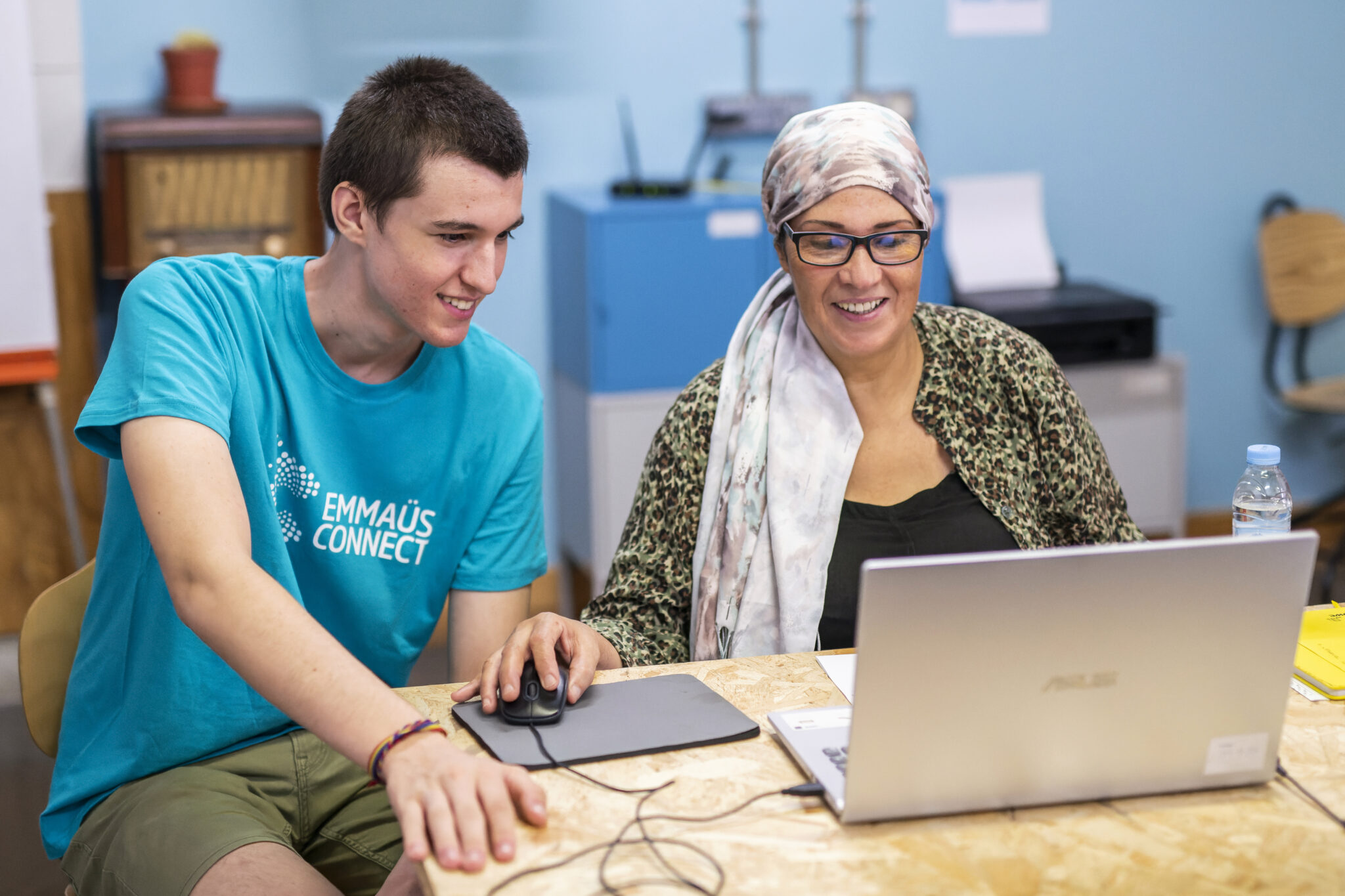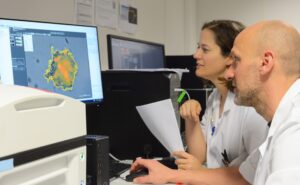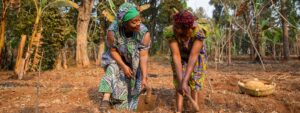The Digital Divide
When Emmaüs Connect was founded, it identified a burgeoning problem. “At the time, France was beginning the dematerialization of its services, and people were still somewhat stuck in the mindset that wasn’t important, that phones, email, those weren’t seen as essentials,” reflects Tom-Louis Teboul, Development and Partnership Manager at Emmaüs Connect. “But we realized if you weren’t digitally equipped, connected, or supported, the consequences are quite significant.”
Access to digital skills and resources is essential in today’s world, from filing taxes to accessing healthcare. According to Ariane Blachier, Development and International Affairs Officer at Emmaüs Connect, “In Europe, 90% of jobs require basic digital skills… It will certainly be even more in the years to come.” Digital exclusion exacerbates inequality, necessitating aggressive action.
In France, 8 million people lack access to vital digital technology, while over one in four low-income Americans lack home internet or a computer. Globally, a third of the population lacks internet access. This divide not only concerns technology access, but also the ability to navigate online services effectively. In France, 16 million people lack digital literacy, a figure mirrored in the US, where 16% of adults are not digitally literate, compared to 23% internationally.
Even in countries with high-levels of internet availability and digital use, exclusion can happen to anyone, and older generations aren’t the only victims. Digital skill requirements have rapidly changed, leaving behind many young people in France. “One out of five young people knows how to use digital technology to play games or chat with friends on social networks, but not necessarily to find a job,” Blachier notes.
In order to build a world where digital inclusion extends to all, Emmaüs Connect works to address the digital divide on all levels by providing affordable access to technological equipment and network connection, made possible by community partnerships and donations from companies and collectives, and by hosting personalized workshops aimed at developing skills necessary for social and professional development.
The Emmaüs Legacy
Emmaüs Connect belongs to the legacy of grassroots community organizing of the Emmaüs movement, founded by priest and humanitarian Abbé Pierre. The movement was launched in France, in the midst of the particularly cold winter of 1954, when those without homes were freezing. Broadcasting a nation-wide appeal on radio for collective action, Abbé Pierre shared his vision for a future in which communities could band together to guarantee shelter, dignity, and solidarity for all people.
Abbé Pierre would go on to travel the world, inspiring the creation of international chapters. Today, hundreds of associations are part of the Emmaüs International umbrella, working tirelessly across multiple areas, including housing, professional development, and access to resources. By leveraging technology to empower marginalized communities, Emmaüs Connect extends the legacy of Abbé Pierre’s vision, advocating for inclusion across multiple fronts beyond digital access, including professional development and social inclusion.
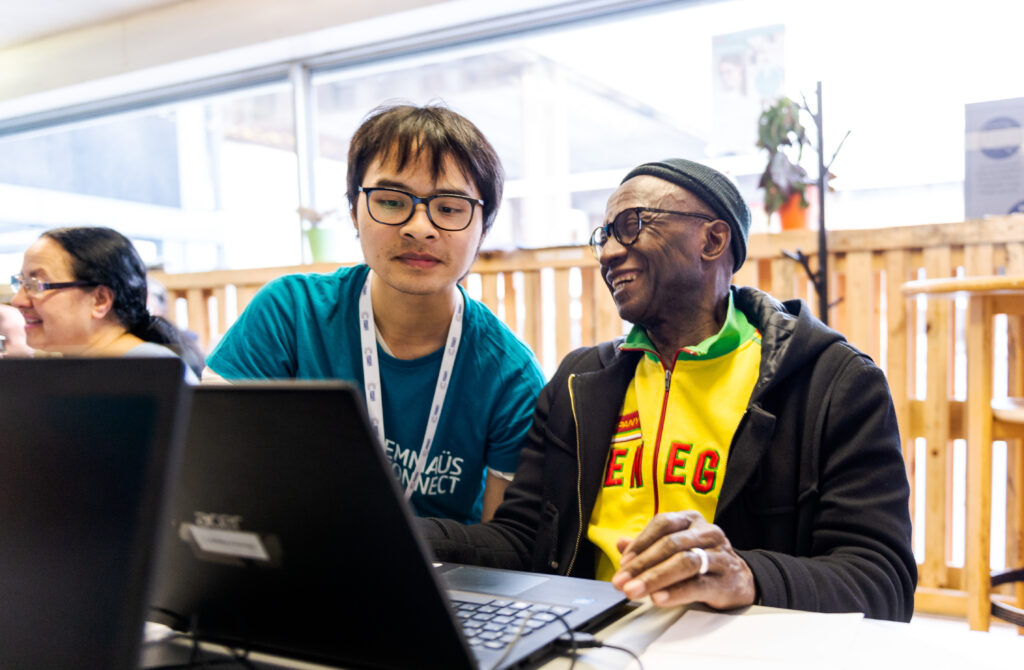
Step One: Equip
The cost of digital equipment is a major barrier to digital inclusion. “More than 80% of our beneficiaries earn less than 1000 euros [per month]. So when the average cost of a smartphone is 500 euros, you need to find solutions on how to equip yourself while still being able to eat,” says Teboul. By mobilizing donors and technology refurbishing partners to support their cause, Emmaüs Connect has developed a sustainable way to provide low cost equipment to those in need.
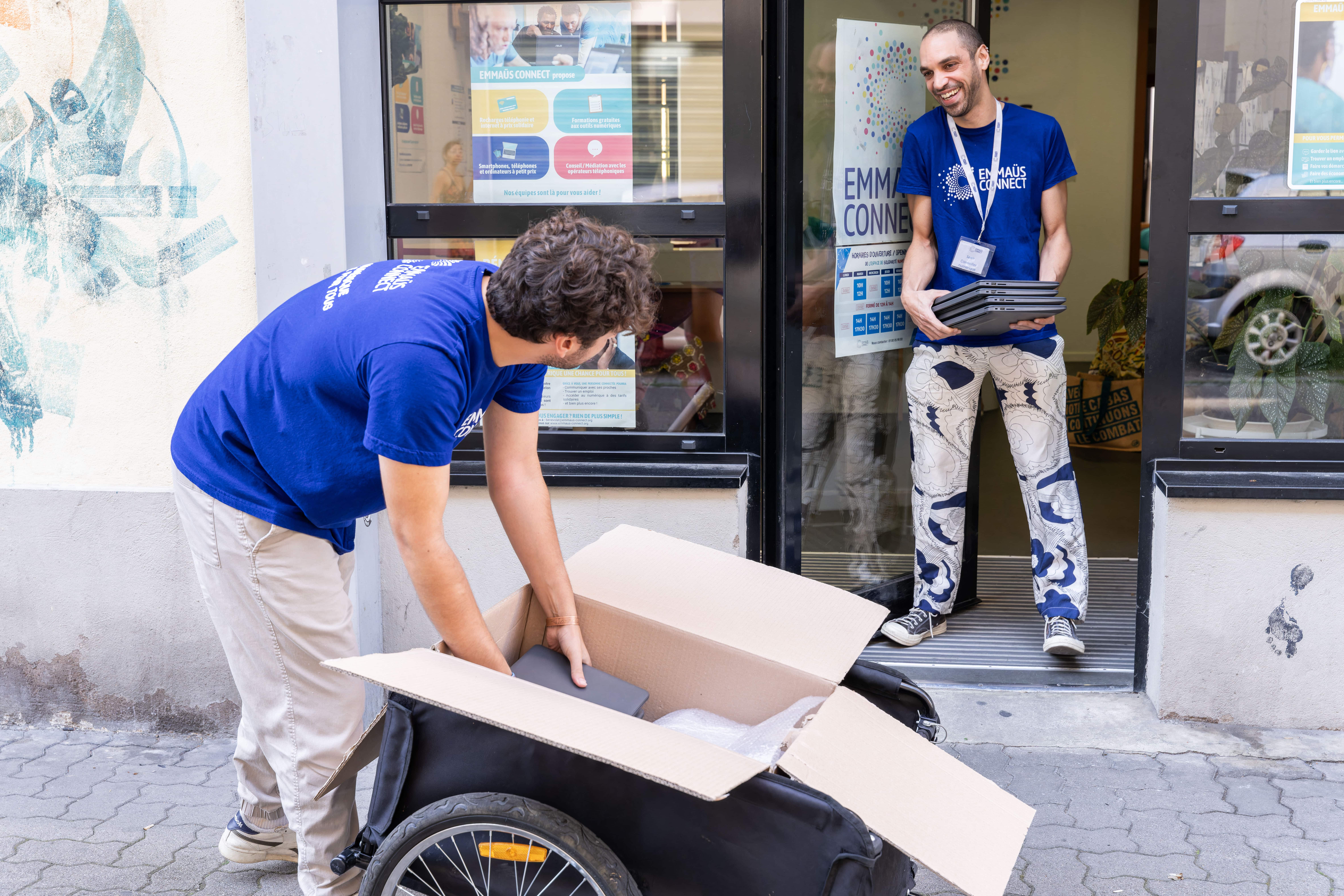
The process works like this: used tech is collected from companies, collectives, and individuals, and then is passed through the capable hands of refurbishing partners. Finally, the restored tech is distributed to beneficiaries by Emmaüs Connect. Through the support of tech donors and partners, this process makes it possible to provide digital equipment at very low costs to those in need, bringing real change to the digital equipment gap. Over 45,000 units have been restored, and the project continues to grow. Find our more information about used tech donating here.
Not only does this initiative provide access to affordable technology, it also tackles the environmental cost of attaining full digital inclusion. It takes a wealth of raw materials to produce a single smartphone, including water, metals, and rare minerals. Many of these materials require intensive mining, putting pressure on already-fragile ecosystems, and exposing workers to hazardous working conditions. “Clearly, the model of [everyone] changing equipment every two years is no longer sustainable,” reflects Teboul. By recycling thousands of used electronic devices, Emmaüs Connect ensures a more sustainable approach to digitization, avoiding the overconsumption of technology and the ever-growing problem of e-waste.
Step Two: Connect
Getting access to data service is crucial to becoming fully autonomous. But phone plans can be just as difficult to obtain as getting access to a device. People experiencing precarious life situations, be that homelessness, migration, unemployment, etc., are often unable to subscribe to phone plans in France, as this requires access to a bank account and stable address. Faced with these institutional barriers, the only option is often costly pre-paid sim cards.
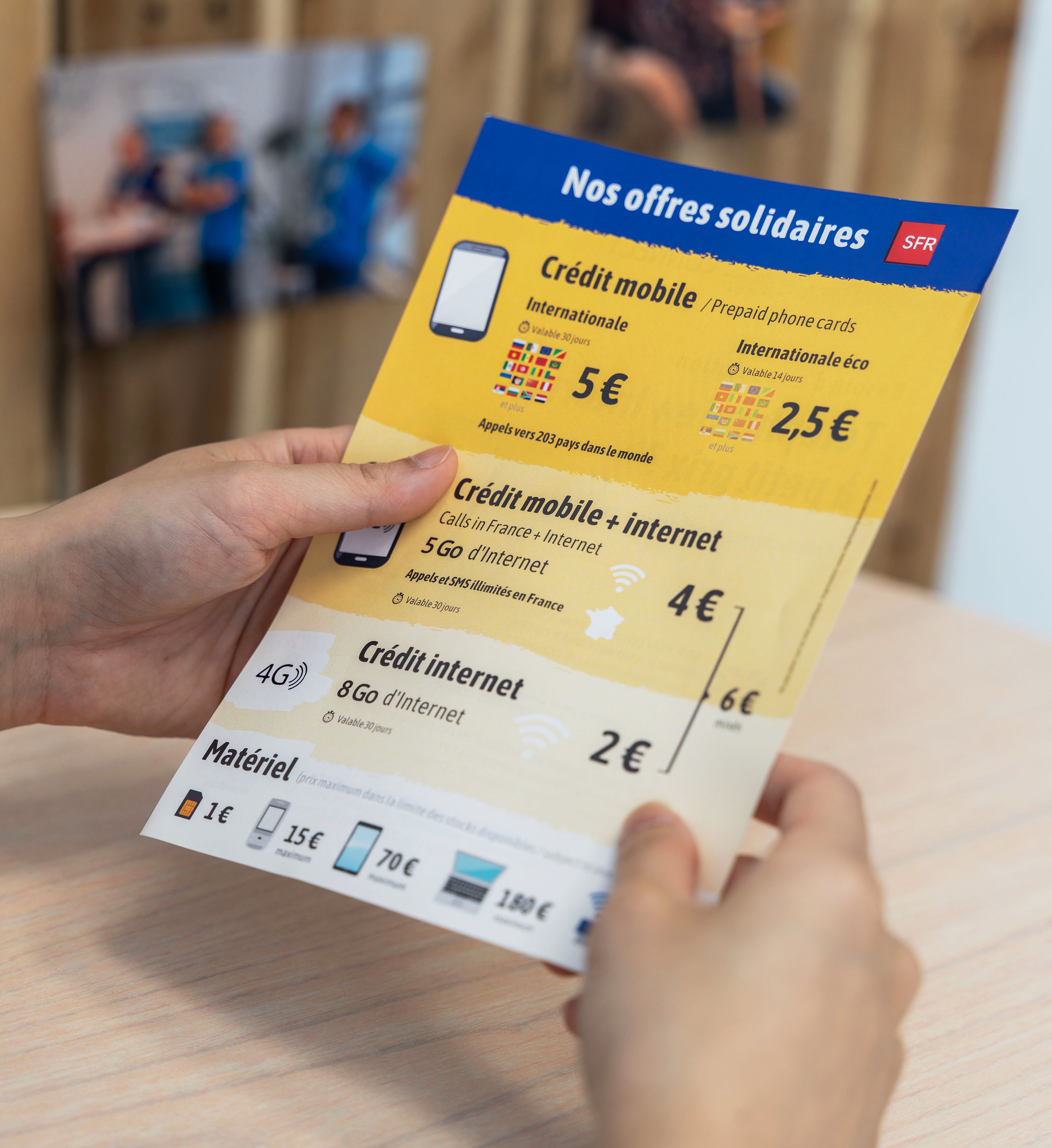
For this reason, Emmaüs Connect has established a partnership with SFR, the second-largest telecom company in France, to provide a low-cost mobile recharge card to disadvantaged individuals. “[Our partnership] allows us to provide phone plans at discounted rates for those in need. We offer a nearly unlimited card for 3 to 4 euros, which is almost unbeatable.” These costs are 40% lower than low-cost pre-paid plans available on the market. “This will enable individuals who are in precarious situations… to have room to breathe, stay in touch with their loved ones, find a job, and get access to online resources, without necessarily spending thousands in [prepaid phone plan fees],” says Teboul.
Step Three: Support
Providing access to equipment and network connection is only half the challenge. To fully address the divide, Emmaüs Connect engages with beneficiaries in person through a long-term, holistic support program. This approach is facilitated through digital community centers, referred to as “solidarity spaces”, present in 19 territories throughout France.
There, beneficiaries are offered access to resources as well as personalized workshops ranging from one-time sessions to longer-terms courses, depending on the profile of the learner. Those with higher levels of digital literacy can benefit from specialized courses centered around themes like job searching and professional digital skill development. The centers also support recently-arrived individuals from outside the European Union who want to both strengthen their French whille learning digital skills.
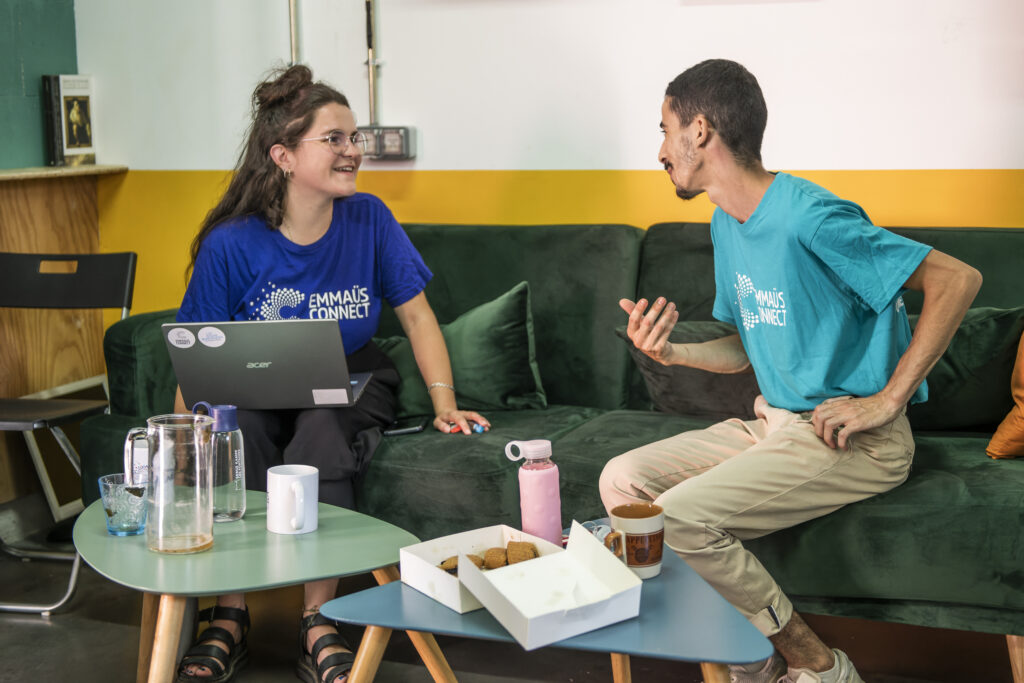
The digital community centers provide not only practical support, but give beneficiaries access to a community. “It’s not for nothing that we don’t call them reception centers, but solidarity spaces,” says Teboul. “You can even come charge your phone and chat over a coffee. It demonstrates that digital technology is at the service of humanity,” not the other way around. This holistic approach is referred to by Emmaüs Connect as “360-degree support”, helping beneficiaries even after they leave the centers.
The centers have had so much success that the model has been expanded beyond Emmaüs spaces to partner associations, creating 500 “Digital Relay Centers”, sites that carry on the baton through the same strategies developed by Emmaüs Connect. View all the sites here. “This allows us to continue our mission to support these 16 million French people in a situation of digital illiteracy, both with our own spaces and with local associations that we have equipped, and coached.” What’s more, Emmaüs Connect has transformed its training programs into a comprehensive social action curriculum, which they use to share best practices and educate thousands of social workers across various institutions in France.
Going Global
Through the three pillars of equipment, connection, and in-person training, Emmaüs Connect has supported over 170,000 people across France, with countless stories of positive impact. Such stories include Eric, who came to Emmaüs Connect after hearing about their services. “When he arrived, … we accompanied Eric through the door of financial inclusion. Then, he enrolled in a workshop, and later became a volunteer. Once he had learned and embraced the philosophy of Abbé Pierre [of] learning to help, he now helps us.”
Eric’s life was changed by Emmaüs Connect in more ways than one. When Eric came to Emmaüs Connect, he didn’t have work authorization documentation and struggled to find a path to employment. Recognizing his valuable contribution to the team, the association fought to get him his papers, and ultimately hired him as a digital mentor. “[It’s] a beautiful story of solidarity that we managed to transmit through the acquisition of skills.”
The impactful initiatives and clear vision of Emmaüs Connect have garnered widespread support in France. Numerous companies, collectives, and institutions have collaborated with them to provide equipment, host training programs, and engage with the community. Moreover, a dedicated team of 1,500 volunteers contributes to a thriving network of mutual aid. Through these partnerships, Emmaüs Connect has made significant progress towards its goal of digital inclusion in France.
Now, the organization is expanding its reach. A pilot project has been initiated in Benin to assist the most digitally excluded groups, including women, young people, and those residing in rural areas. With plans for further expansion, Emmaüs Connect aims to make a global impact. Their innovative practices serve as blueprints that can be shared and adopted by other countries, particularly in cross-Atlantic collaborations, Teboul and Blachier emphasize. But achieving the goal of complete digital inclusion will take the support of the global community.
Emmaüs Connect has partnered with the Friends of Fondation de France to share their vision with American donors who wish to make a difference in the global digital divide. “The fact is that among the millions of people we want to reach, without additional resources, we won’t be able to help everyone. We need everyone’s support,” voices Teboul. By making tax-ductible donations through Friends of Fondation de France to Emmaüs Connect, donors take an active role in closing the digital gap, allowing those in need to reconnect to society with independence, dignity, and a sense of community.
